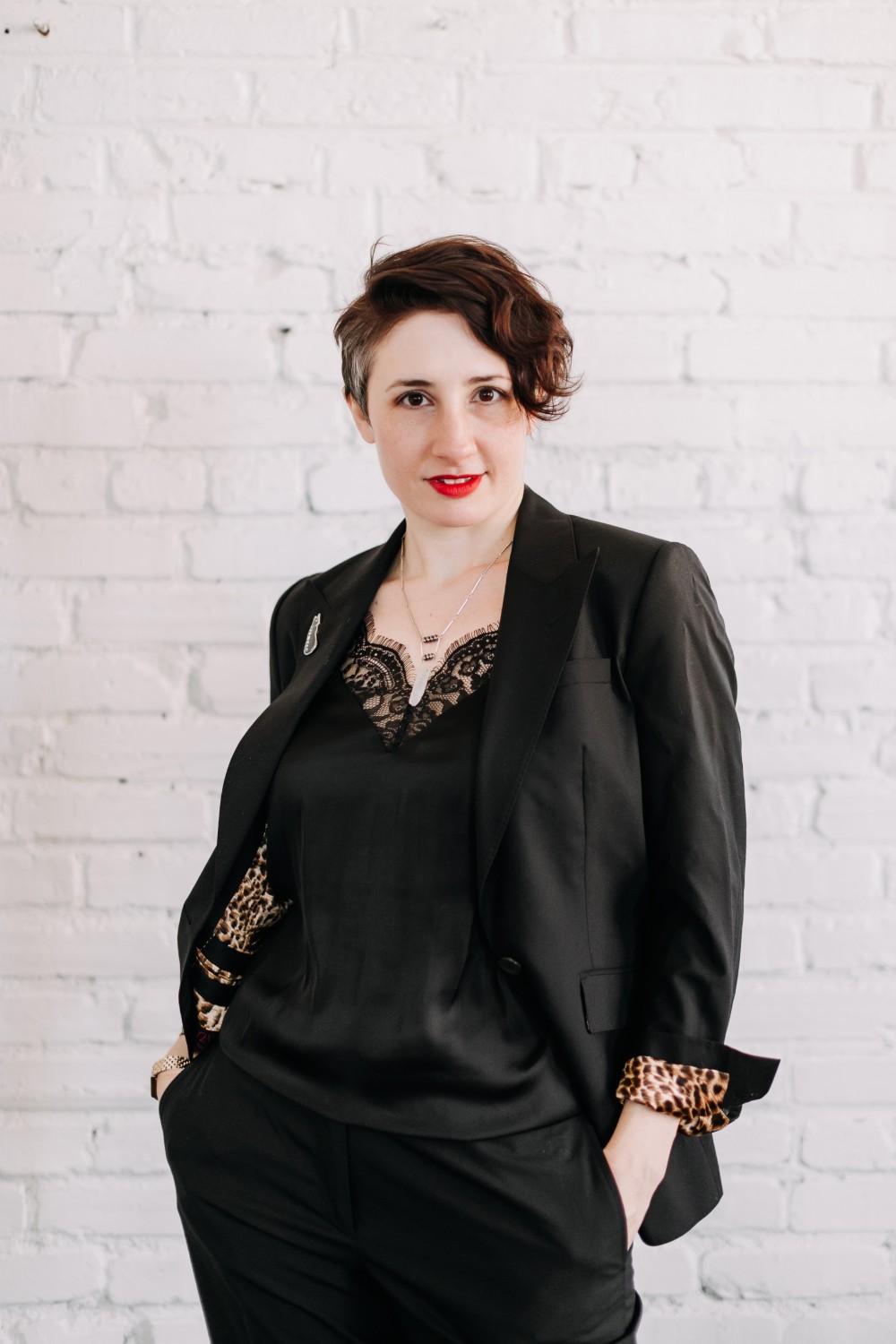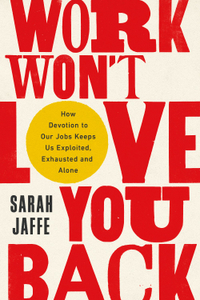Work won’t love you back, so why are we still trying to find fulfilment in our 9–5?
Journalist Sarah Jaffe’s new book is asking the all-important question of why we’re still giving so much of ourselves to work, when it refuses to love us back


Journalist Sarah Jaffe’s new book is asking the all-important question of why we’re still giving so much of ourselves to work, when it refuses to love us back
A sacred (and conveniently shareable) phrase of the peppy influencer: “Do something you love, and you’ll never work a day in your life.”
To that, labour journalist and author of Work Won’t Love You Back, Sarah Jaffe, has something to say. In fact, she has several things to say, and says them over the course of 279 (375 if you count notes, acknowledgements and index) perfectly paced pages. Jaffe’s question is simple: why are we so devoted to our jobs, when they yield very little in return? But her argument is nuanced, carefully researched and devastatingly convincing as to why we should all stop trying to find fulfilment in the daily grind.

Where once it was acceptable to treat work solely as a means of paying our bills, now we’re encouraged – if not expected – to find joy in it, too. Companies expect long hours of employees and recompense them by adding a games room, gym and free meals scheme to the office so they don’t have to leave very often. Corporate bosses refer to the workplace as a "family". Those wanting to break into what are typically considered creative careers – journalism, publishing, fashion, the arts – are expected to work for next to nothing before landing a ‘dream job’.
The list is endless – and when you unpack it as scrupulously as Jaffe has here, it makes for a frightening portrait of just how much our attitudes to work are contributing to record levels of burnout, stress and isolation.
Sacking in the dream job
“Jobs that you don’t, frankly, have to pretend to like are disappearing – jobs wherein as long as you did the job, it didn’t matter whether or not you were smiling on the assembly line,” Jaffe tells us from her apartment in New York.
“Instead we get work that requires more of us to be emotionally invested in it – whether that’s the dream job you're supposed to want so much that you have to do a whole bunch of unpaid and underpaid work to get to the point where you can actually do it, or the work wherein you’re directly responsible for making somebody else feel good, comfortable and safe.”
Marie Claire Newsletter
Celebrity news, beauty, fashion advice, and fascinating features, delivered straight to your inbox!
So should we sack in the idea of the dream job altogether?
“I don’t want to go back to waiting tables, I would much prefer to stay doing journalism,” says Jaffe, who had been thinking through the book for years – through tip-reliant waitressing jobs and freelance journalism gigs. “But I think the questions we should be asking are: how do we improve everybody’s conditions at work, regardless of whether it’s the dream job, or it’s the thing you’re doing for now to pay the bills. The real thing that would allow people to be less miserable at work is some ability to push back when conditions are bad, to take more time off. I also think all of us doing less work would be a great idea for everyone.”
The problem, argues Jaffe, is the prevailing myth of the labour of love. So committed to our jobs are we that even as we watch rolling news coverage of the pandemic and climate change, our work patterns have changed very little – beyond the fact that 40% of us are working longer hours from our kitchen tables.
'We shouldn't need work to feel fulfilled as people'
Jaffe finished the first draft of Work Won't Love You Back just as the pandemic hit, though she says she had to amend very little. “The argument of the book didn’t change. The contradictions and frankly the coercion at the heart of work became more obvious when I was talking to people who are suddenly worried that they’re going to be pushed back into the workplace, even though they could get sick.”
Work Won't Love You Back: How Devotion to Our Jobs Keeps Us Exploited, Exhausted and Alone (Hardback) – £20 | Waterstones
In this, she found common ground between the likes of the gig-economy Uber driver and a short-term-contract university academic. If our stereotype of working class people is a “white man working in a factory”, we need to revisit that definition.
“The working class now is more likely to be in a feminised service job,” she says. “And even when we're working in the conditions of white collar work like journalism, in many cases [those jobs] have a lot more in common with insecure gig work than we would like to think.”
The pandemic’s exposure of ‘key workers’ – NHS staff, those in caring professions, teachers, supermarket workers, delivery drivers – how much we rely on them and how little we pay them, has opened up an important conversation about what work is actually valuable.
“How much of that is about who is doing the work? The irony is that those are the jobs on which the entire economy is built,” says Jaffe. “It’s a really important time to say: what is actually necessary about work, and what isn’t. And one of the things that isn't necessary is the idea that we need work just to be fulfilled as people.”
'Most women are "leaning in" so hard that they’re falling over'
Like many women (even those who are sometimes reluctant to admit it), Jaffe is wary of the women can have it all narrative. She draws heavily on the Wages for Housework movement in the book – a group of women in the 70s who argued that work in the home was necessary for the functioning of capitalism, and it should therefore be treated as such with a wage. An argument that has never been more salient as in the past year, as women find themselves harboured with the majority of domestic work and homeschooling on top of their long hours at work.
“It’s the Lean In story,” says Jaffe. “There was a really big fight in American feminism when Sheryl Sandberg’s Lean In came out. A lot of us were like: wait a minute, most women are actually leaning in so hard already they’re falling over. We don’t get the chance to get promoted up the ladder. It’s pyramid shaped for a reason, and only so many women get to be at the top because their position requires a whole lot of the rest of us underneath doing the work. The argument is not so easy.”
In the hallowed words of Michelle Obama, “That sh*t doesn’t work all the time.”
Work Won’t Love You Back by Sarah Jaffe is published by Hurst, and available in hardback now.
Kate McCusker is a freelance writer at Marie Claire UK, having joined the team in 2019. She studied fashion journalism at Central Saint Martins, and her byline has also appeared in Dezeen, British Vogue, The Times and woman&home. In no particular order, her big loves are: design, good fiction, bad reality shows and the risible interiors of celebrity houses.
-
 Prince Harry's "proud" words about wife Meghan Markle are going viral
Prince Harry's "proud" words about wife Meghan Markle are going viralBy Jenny Proudfoot
-
 Sources have opened up about Timothée Chalamet and Kylie Jenner's "intense" start to the year
Sources have opened up about Timothée Chalamet and Kylie Jenner's "intense" start to the yearBy Jenny Proudfoot
-
 Two Hollywood actresses were offered the role of Carrie Bradshaw before Sarah Jessica Parker
Two Hollywood actresses were offered the role of Carrie Bradshaw before Sarah Jessica ParkerBy Jenny Proudfoot
